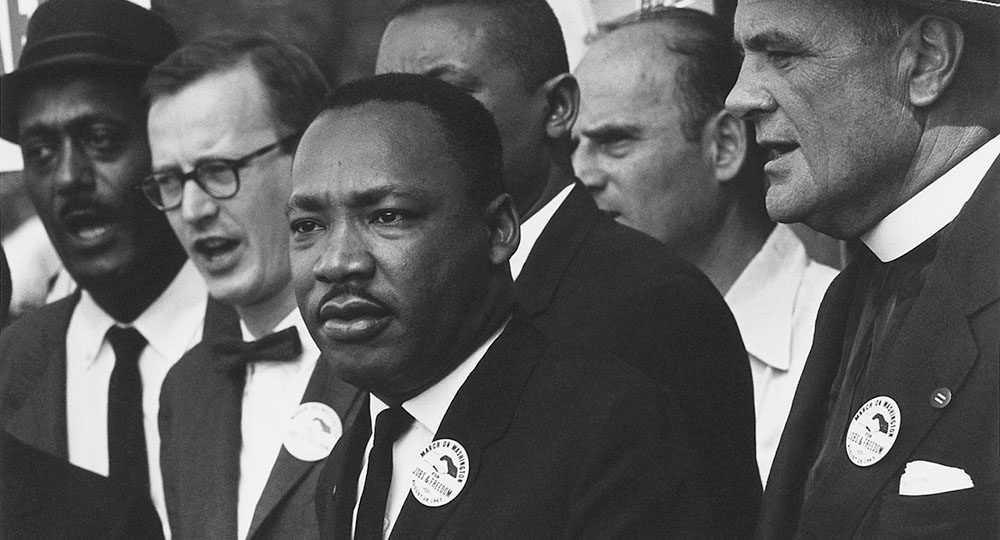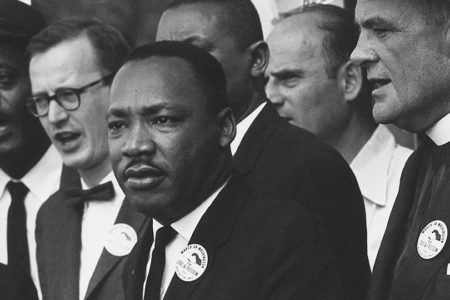Still Dreaming
Few people today see the relevance of theology. But more things are wrought by theology than this world dreams of, including aspects of the current civil rights movement.
To some, it may have seemed like an odd pairing. But not to Natan Sharansky. As he sat with Martin Luther King III on a Sunday morning in Jerusalem, he felt like they were colleagues sharing the same goals. Being with King in Israel, said Sharansky, felt like coming “full circle.”1
Sharansky would know. Today he is chairman of the Jewish Agency. But from 1977 to 1986 he was imprisoned in a draconian Soviet labor camp where he became an international symbol of resistance and the fight for freedom. King is the eldest son of legendary American civil rights leader Dr. Martin Luther King Jr. who led more than 200,000 people in the March on Washington in 1963. It was then Dr. King delivered his famous “I Have a Dream” speech that envisioned equality and freedom for everyone regardless of color or religion.
Sharansky and King met last spring when King presented three people with awards from the Drum Major Institute for their work on behalf of Israel’s Ethiopian Jewish immigrants. In 1961 King’s father and his Jewish advisor, Harry Wachtel, established the institute; and today King is president.
“Israel can be very proud,” Sharansky posted on his Facebook page, “that we are the only country in the world that took a hundred thousand people from Africa and brought them here not as slaves, not as foreign workers, not as refugees, but as full and equal citizens.”
That being the case, you would think the Black Lives Matter (BLM) movement would support Israel, or at least its right to exist. But BLM’s theology differs vastly from that of Dr. Martin Luther King, and it is pulling the movement in a completely different direction.
The Way Things Were
Dr. King quoted Bible prophets like Amos and Isaiah: “We will not be satisfied until justice rolls down like waters and righteousness like a mighty stream”2 (cf. Amos 5:24). He declared,
I have a dream that one day every valley shall be exalted, every hill and mountain shall be made low. The rough places will be made plain, and the crooked places will be made straight. And the glory of the Lord shall be revealed, and all flesh shall see it together3
(cf. Isa. 40:4–5).
Dr. King also supported Israel. In 1967 he wrote a letter to Adolf Held of the Jewish Labor Committee: “I could not have supported any resolution [at the Southern Christian Leadership Conference] calling for black separatism or calling for a condemnation of Israel and an unqualified endorsement of the policy of the Arab powers.” He added, “Israel’s right to exist as a state is incontestable.”4
Less than a year later, weeks before James Earl Ray shot Dr. King to death on April 4, 1968, at a motel in Memphis, Tennessee, Dr. King addressed the annual convention of the Rabbinical Assembly:
Peace for Israel means security, and we must stand with all our might to protect her right to exist, its territorial integrity and the right to use whatever sea lanes it needs. Israel is one of the great outposts of democracy in the world, and a marvelous example of what can be done, how desert land can be transformed into an oasis of brotherhood and democracy. Peace for Israel means security, and that security must be a reality.5
For many, Black Lives Matter reminds them of the days of the civil rights movement, which drew so many Jewish people to Washington in 1963.
“[My father] was rabbi of Beth Jacob in Baltimore at the time,” recalled Batya Miller, daughter of Rabbi Uri Miller who gave the opening prayer at the March on Washington. “For years before the march, he had been giving sermons on civil rights to his congregants who were not always sympathetic….His participation in the march as president of the Synagogue Council of America was…the best way possible to personally contribute to the advancement of racial justice.”6
Part of Jewish theology, in fact, involves pursuing social justice. Social justice motivated Michael Schwerner, Andrew Goodman, and James Chaney (two Jews and an African American, all in their 20s) to go to Mississippi to register African Americans to vote. They were murdered there by the Ku Klux Klan in June 1964.
The Anti-Israel Shift
Unfortunately, BLM’s theology is not like Dr. King’s. BLM rejects the traditional black church and, according to its website, “is a tactic to (re)build the Black liberation movement.”7
BLM also rejects the literal-historical-grammatical method of biblical interpretation, along with “any conservative theology about keeping the peace, praying copiously, or turning the other cheek.”8 BLM sees Jesus as a “revolutionary,”9 a “Palestinian Jew” who “lived under occupation and was ultimately lynched for speaking truth to power.”10
Its members want to reimagine the gospel. Pastors are called “Movement Pastors,” and BLM says they are “radically transforming the idea of what the 21st-century black church should be.”11 Whereas the church of Dr. King’s day held Israel sacrosanct, BLM churches favor the Arabs.
This view of Israel was revealed in August when Movement for Black Lives (MBL), a coalition of more than 50 organizations associated with BLM, smeared Israel in its platform, calling it an “apartheid state” guilty of “genocide…against the Palestinian people.”12 The platform unbiblically views Israel as an occupier of Arab land.
It is not surprising BLM’s theology sees no future for Israel in God’s prophetic program: It embraces Replacement Theology. Fortunately, a number of black, conservative church leaders reject that position and call the platform a “vitriolic attack against Israel laced with misinformation and anti-Semitism and an agenda that is not embraced by the broader African-American community.”13
Theology Matters
BASIC THEOLOGY
You can learn how to develop an accurate, biblical theology by ordering your copy of Basic Theology by Charles Ryrie.
The book of Judges shows what happens when defective theology reigns. After Joshua died and Israel had settled the land, most of the people rejected God’s Law and turned to idols. Thus a generation arose that “did not know the Lord nor the work which He had done for Israel” (Jud. 2:10). People turned away from God, and “everyone did what was right in his own eyes” (21:25). They did their own thing, and it brought them trouble.
Theology at its core is the study of God and His relationship to the world. Some people consider it divisive and complex—something best forgotten. But theology determines a person’s worldview and behavior and affects societies and nations. It influenced the writing of America’s Declaration of Independence, and it influenced the Rev. Martin Luther King Jr. in his fight for justice against racism.
God gave us His Word so that we can know Him and understand His program for the world. That program includes Israel. As for Dr. King’s wonderful dream, theology demands we understand that it will only be realized when Jesus the Messiah finally returns to Earth.
ENDNOTES
- Daniel K. Eisenbud, “Martin Luther King Jr.’s son champions father’s dream for Ethiopian Jews,” May 8, 2016, The Jerusalem Post <tinyurl.com/hvwvrq7>.
- Rev. Martin Luther King, “I Have a Dream” (speech, March on Washington, Washington, DC. August 28, 1963), 4 <archives.gov/press/exhibits/dream-speech.pdf>.
- Ibid, 5.
- Stuart Appelbaum, “A Special Bond: Martin Luther King, Jr., Israel and American Jewry,” Jewish Journal, January 18, 2013 <tinyurl.com/aoo8rmx>.
- “Black-Jewish Relations: Martin Luther King and Israel,” Jewish Virtual Library <tinyurl.com/mhpfczv>.
- Seth Berkman, “The Jews Who Marched on Washington With Martin Luther King,” August 27, 2013, forward.com <tinyurl.com/gw29skw>.
- “About #BlackLivesMatter,” blacklivesmatter.com.
- “11 Major Misconceptions About the Black Lives Matter Movement,” blacklivesmatter.com <tinyurl.com/hoybgt9>.
- Ibid.
- Sam Kestenbaum, “Churches Split Over Black Lives Matter’s Criticism of Israel,” August 22, 2016, forward.com <tinyurl.com/hmxe2um>.
- Ibid.
- Eric Cortellessa, “In platform, Black Lives Matter accuses Israel of ‘genocide,’ backs BDS,” August 3, 2016, timesofisrael.com <tinyurl.com/z8oauaf>.
- Kestenbaum.







